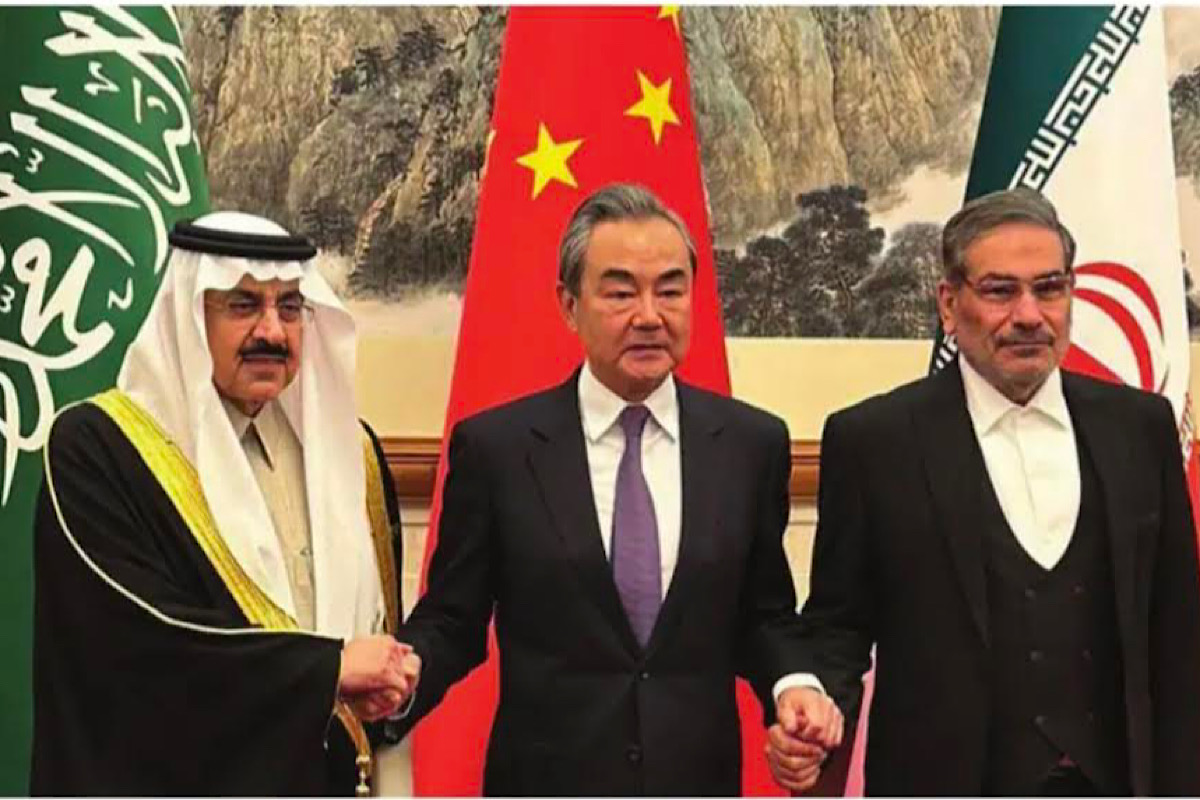Iran hails progress in cooperation with Saudi Arabia
Iran's Foreign Minister Hossein Amir-Abdollahian has hailed the success in the expansion of cooperation between Tehran and Riyadh following their normalisation of bilateral ties.
China has met with undeniable success in facilitating the long-pending rapprochement between two bitter sectarian rivals across the Persian Gulf i.e., Shia-dominated Iran and Sunni-dominated Saudi Arabia. Ummah (Muslim World) has seen these two powers shadowbox with each other by supporting their respective proxies in countries like Lebanon, Iraq, Syria, Yemen etc., even though they ostensibly hold similar positions on issues like Palestine and Islamophobia

Representation image (PHOTO:ANI)
Former Chinese President Deng Xiaoping’s defensive foreign policy of taoguang yanghui or “hide one’s talent and bide one’s time” has outlived its utility. President Xi Jinping’s China sees the ensuing global turbulence as an ideal time to project power across the globe and be counted as a Superpower.
The means to do so go beyond those afforded by the foundational ‘military-industrial complex’ i.e., economic, infrastructural, militaristic, to the realm of cultural, technological, political, soft power etc.
However, there is yet another lever that is powerfully symbolic of having arrived on the global high table i.e., mediative powers.
Advertisement
Only a country that is supposedly significant in scale, importance, imagination and presumably unbiased in the eyes of two differing nations can ever be considered worthy of intervening and being taken seriously.
Beyond its potent combination of coercive expansionism, economic bailouts, veto powers, infrastructural investments like Belt and Road Initiative (BRI), the Chinese are now seen actively mediating between the Russians and Ukrainians, as also between Saudi Arabia and Iran.
While China’s unsolicited mediation in the bloody RussianUkrainian battle was clearly ambitious given Beijing’s unequivocal tilt in the conflict with the US accusing it of “parroting the Russian propaganda”, it did present a 12-point position paper that calls for respecting territorial sovereignty.
However, China has met with undeniable success in facilitating the long-pending rapprochement between two bitter sectarian rivals across the Persian Gulf i.e., Shia-dominated Iran and Sunni-dominated Saudi Arabia.
Ummah (Muslim World) has seen these two powers shadowbox with each other by supporting their respective proxies in countries like Lebanon, Iraq, Syria, Yemen etc., even though they ostensibly hold similar positions on issues like Palestine, Islamophobia etc.
What flared the situation between these two traditionally hostile nations was the execution of a prominent Shia cleric, Nimr-al-Nimr, in Saudi Arabia and the subsequent storming of the Saudi Embassy in Iran.
Tensions reached a level that they cut diplomatic ties and Iran went to the extent of stopping its citizens from traveling to the Haj pilgrimage temporarily. The killing battlegrounds of Yemen and the Syrian swathes witnessed an intensified conflict as rival militias linked to Tehran and Riyadh upped the ante.
Although discreet attempts like five rounds of reconciliation talks were hosted by the Iraqi regime, it finally took the conclusive push by Beijing to get both sides to shake hands.
In March, Supreme National Security Council of Iran secretary Ali Shamkhahni and the Saudi Arabian National Security Advisor, Musaed Al-Aiban, signed the deal that was brokered by China.
This brokerage by the Chinese could credibly be read as Beijing’s first real arrival on the global stage as a ‘fixer’ of issues, and concurrently a tell-tale sign of America’s unmistakable decline and irrelevance.
The unprecedented success of the Chinese flies in the face of US President Joe Biden earlier insistence that Washington DC would not secede strategic space in the Middle East to “walk away and leave a vacuum to be filled by China, Russia and Iran”. On the contrary, this brokerage by the Chinese contradicts Mr. Biden’s assertion.
That this thaw also fits in well with China’s own energy insecurities and the constant need for ‘markets’, the far larger import of Beijing’s effort is the willy-nilly announcement of an ‘arrived’ superpower that is perceived as a capable and credible entity to resolve global disputes. In many ways, the Chinese diplomatic ‘flex’ has gone beyond its usual clientage of ‘pariah’ and vassalized states like North Korea, Pakistan, or the junta-ruled Myanmar.
Two of the most powerful and influential states within the comity of 57 Islamic countries have seemingly reposed faith and benefited from Chinese intervention.
Already, follow-up meetings are also planned in China and the Saudi newspaper, Asharq alAwasat explained the logic for the venue as it “came as an extension of Beijing’s positive role in reaching the agreement and facilitating communication between the two countries”. The unofficial Chinese mouthpiece, Global Times, mocked the West’s effort to “promote so-called democratic transformation” in the region.
That this conflict did entail two countries that are essentially illiberal, theocratic, and undemocratic is a fact, as is the fact their regimes do not like the preachy and condescending tones of the West which threatens their stranglehold over the government. The Chinese have no such pre-conditions.
The newspaper rattled off the list of Chinese carrots on display, “Since the new era, China has launched and proposed a series of ideas and practices including a global community of shared future, the Belt and Road initiative, as well as the Global Development Initiative, the Global Security Initiative and the Global Civilization Initiative, which are compatible with the needs of the people in the Middle East who have long been troubled by war, confrontation and civilizational tensions”.
This is indeed a lot more than what an economically distressed ‘West’ can offer anytime soon. While it is early days to say conclusively that the Chinese deal will stand the test of time and the civilisational schism, a new broker has certainly entered the ‘market’.
Beijing will extract its own pound of flesh, as always, and with China desperate to shore up support on contentious issues like Taiwan tensions, trade wars etc., the timing is significant for China too.
(The writer is Lt Gen PVSM, AVSM (Retd), and former Lt Governor of Andaman & Nicobar Islands and Puducherry)
Advertisement